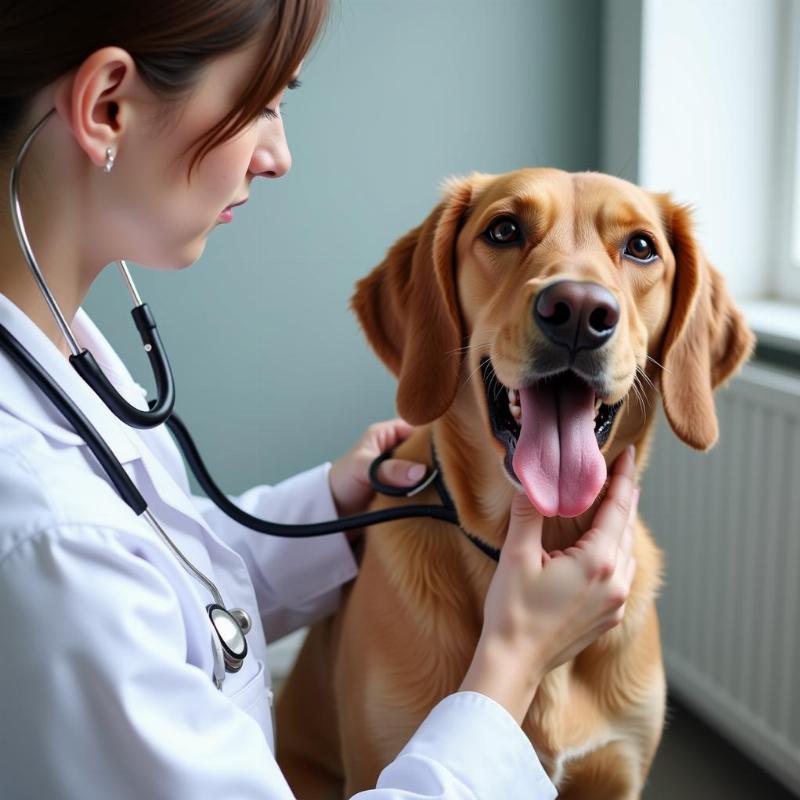Heavy panting in dogs at night can be alarming for owners. While some panting is normal, especially after exercise or on a hot day, excessive panting at night warrants closer attention. Understanding the potential reasons behind your dog’s heavy nighttime panting is crucial for ensuring their well-being. This article explores the various causes, from the benign to the more serious, providing you with the knowledge to take appropriate action.
Common Causes of Nighttime Panting in Dogs
Several factors can contribute to heavy panting in dogs at night. These include:
- Heat: Dogs don’t sweat like humans do, so they rely on panting to regulate their body temperature. A warm room, thick bedding, or cuddling close to their owner can cause overheating, especially in breeds with thick coats. Ensure your dog has access to a cool, well-ventilated area at night.
- Anxiety or Stress: Just like humans, dogs can experience anxiety and stress. Nighttime can be particularly challenging for some dogs, especially if they suffer from separation anxiety or fear of the dark. Changes in routine, loud noises, or even thunderstorms can trigger anxiety-induced panting.
- Pain or Discomfort: If your dog is experiencing pain, they may pant heavily as a way to cope. Arthritis, injuries, or other medical conditions can cause discomfort that’s exacerbated at night. Look for other signs of pain, such as limping, whining, or restlessness.
- Obesity: Overweight dogs are more prone to panting, as their bodies have to work harder to regulate temperature and perform basic functions. Maintaining a healthy weight through proper diet and exercise is crucial for your dog’s overall health and can significantly reduce panting.
When to Worry About Heavy Panting
While occasional heavy panting might not be cause for concern, persistent or excessive panting, especially when accompanied by other symptoms, should be addressed by a veterinarian. These symptoms might include:
- Pale gums: Pale or bluish gums can indicate a lack of oxygen and may be a sign of a serious medical condition.
- Rapid breathing: Panting combined with rapid, shallow breathing can signal respiratory distress.
- Weakness or lethargy: If your dog seems unusually tired or weak along with panting, it could be a sign of an underlying illness.
- Coughing or gagging: These symptoms, coupled with panting, may indicate a respiratory infection or heart problem.
- Changes in behavior: Sudden changes in your dog’s behavior, such as restlessness, pacing, or hiding, can indicate pain or distress.
 Dog panting being examined by a vet
Dog panting being examined by a vet
Addressing Heavy Panting in Dogs
If your dog is panting heavily at night, consider the following steps:
- Ensure a Comfortable Environment: Provide a cool, quiet, and comfortable sleeping area for your dog. Consider using a cooling mat or fan, especially during warmer months.
- Reduce Stress and Anxiety: Create a calming bedtime routine, offer a comforting toy or blanket, and consider using pheromone diffusers or calming supplements.
- Maintain a Healthy Weight: If your dog is overweight, work with your veterinarian to develop a weight loss plan.
- Consult Your Veterinarian: If the panting persists or is accompanied by other symptoms, schedule an appointment with your veterinarian as soon as possible. They can diagnose any underlying medical conditions and recommend appropriate treatment.
Conclusion
Heavy panting at night in dogs can be a sign of anything from simple overheating to a serious medical condition. By understanding the potential causes and observing your dog closely, you can take the necessary steps to ensure their comfort and well-being. Don’t hesitate to contact your veterinarian if you have any concerns about your dog’s health.
FAQ
- Is it normal for dogs to pant at night? Some panting is normal, but excessive or persistent panting can be a sign of a problem.
- What can I do to help my dog stop panting at night? Ensure a cool environment, reduce stress, and consult your vet if necessary.
- When should I take my dog to the vet for panting? If the panting is severe, persistent, or accompanied by other symptoms, contact your vet immediately.
- Can anxiety cause panting in dogs at night? Yes, anxiety and stress can lead to heavy panting, especially at night.
- Could my dog’s heavy panting be a sign of pain? Yes, panting can be a sign of pain or discomfort.
- What are some serious medical conditions that can cause panting? Heart problems, respiratory issues, and certain infections can cause panting.
- How can I tell if my dog’s panting is serious? Look for other symptoms like pale gums, rapid breathing, weakness, or changes in behavior.
Related Articles
- excessive panting in older dog at night
- dog heavy breathing when sleeping
- elderly dog panting all the time
- why my dog is breathing heavily
- dog harness for hot weather
Beautdogs.us is your premier online destination for all things dog-related in the US. We offer expert advice on dog breeds, care, and the latest products, catering to both new and experienced dog owners. From understanding why your dog is panting at night to finding the perfect harness for summer walks, Beautdogs.us is your trusted source for comprehensive and engaging canine information. Contact us today for expert advice! Email: [email protected], Phone: +1 501-555-7529.